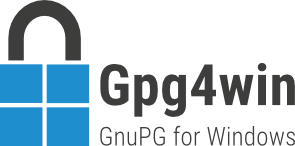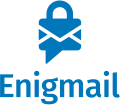Pretty Good Privacy (PGP) is an encryption program that provides cryptographic privacy and authentication for data communication. PGP is used for signing, encrypting, and decrypting texts, e-mails, files, directories, and whole disk partitions and to increase the security of e-mail communications. Phil Zimmermann developed PGP in 1991.

GNU Privacy Guard is a free-software replacement for Symantec's PGP cryptographic software suite. The software is compliant with RFC 4880, the IETF standards-track specification of OpenPGP. Modern versions of PGP are interoperable with GnuPG and other OpenPGP-compliant systems. GnuPG is however expected to break compliance with the upcoming revision of OpenPGP and thus with other implementations that will continue to comply.

Mozilla Thunderbird is free and open-source email client software which also functions as a full personal information manager with a calendar and contactbook, as well as an RSS feed reader, chat client (IRC/XMPP/Matrix), and news client. Available cross-platform, it is operated by the Mozilla Foundation's subsidiary MZLA Technologies Corporation. Thunderbird is an independent, community-driven project that is managed and overseen by the Thunderbird Council, which is elected by the Thunderbird Community. The project strategy was originally modeled after that of Mozilla's Firefox web browser and is an interface built on top of that web browser.

Werner Koch is a German free software developer. He is best known as the principal author of the GNU Privacy Guard. He was also Head of Office and German Vice-Chancellor of the Free Software Foundation Europe. He is the winner of Award for the Advancement of Free Software in 2015 for founding GnuPG.
In cryptography, Camellia is a symmetric key block cipher with a block size of 128 bits and key sizes of 128, 192 and 256 bits. It was jointly developed by Mitsubishi Electric and NTT of Japan. The cipher has been approved for use by the ISO/IEC, the European Union's NESSIE project and the Japanese CRYPTREC project. The cipher has security levels and processing abilities comparable to the Advanced Encryption Standard.
S/MIME is a standard for public-key encryption and signing of MIME data. S/MIME is on an IETF standards track and defined in a number of documents, most importantly RFC 8551. It was originally developed by RSA Data Security, and the original specification used the IETF MIME specification with the de facto industry standard PKCS #7 secure message format. Change control to S/MIME has since been vested in the IETF, and the specification is now layered on Cryptographic Message Syntax (CMS), an IETF specification that is identical in most respects with PKCS #7. S/MIME functionality is built into the majority of modern email software and interoperates between them. Since it is built on CMS, MIME can also hold an advanced digital signature.
In computer security, a key server is a computer that receives and then serves existing cryptographic keys to users or other programs. The users' programs can be running on the same network as the key server or on another networked computer.
The following tables compare general and technical features of notable email client programs.
Off-the-record Messaging (OTR) is a cryptographic protocol that provides encryption for instant messaging conversations. OTR uses a combination of AES symmetric-key algorithm with 128 bits key length, the Diffie–Hellman key exchange with 1536 bits group size, and the SHA-1 hash function. In addition to authentication and encryption, OTR provides forward secrecy and malleable encryption.

Network Security Services (NSS) is a collection of cryptographic computer libraries designed to support cross-platform development of security-enabled client and server applications with optional support for hardware TLS/SSL acceleration on the server side and hardware smart cards on the client side. NSS provides a complete open-source implementation of cryptographic libraries supporting Transport Layer Security (TLS) / Secure Sockets Layer (SSL) and S/MIME. NSS releases prior to version 3.14 are tri-licensed under the Mozilla Public License 1.1, the GNU General Public License, and the GNU Lesser General Public License. Since release 3.14, NSS releases are licensed under GPL-compatible Mozilla Public License 2.0.

WinPT or Windows Privacy Tray is frontend to the Gnu Privacy Guard (GnuPG) for the Windows platform. Released under GPL, it is compatible with OpenPGP compliant software.
Email encryption is encryption of email messages to protect the content from being read by entities other than the intended recipients. Email encryption may also include authentication.

Gpg4win is an email and file encryption package for most versions of Microsoft Windows and Microsoft Outlook, which utilises the GnuPG framework for symmetric and public-key cryptography, such as data encryption, digital signatures, hash calculations etc.

GPG Mail is a commercial extension for Apple Mail which comes as part of GPG Suite, a software collection that provides easy access to a collection of tools designed to secure your communications and encrypt files. GPG Mail provides public key email encryption and signing. It integrates with the default email client Apple Mail under macOS and the actual cryptographic functionality is handled by GNU Privacy Guard.
DNS-based Authentication of Named Entities (DANE) is an Internet security protocol to allow X.509 digital certificates, commonly used for Transport Layer Security (TLS), to be bound to domain names using Domain Name System Security Extensions (DNSSEC).

pretty Easy privacy was a pluggable data encryption and verification system that provided automatic cryptographic key management through a set of libraries for written digital communications.
Nitrokey is an open-source USB key used to enable the secure encryption and signing of data. The secret keys are always stored inside the Nitrokey which protects against malware and attackers. A user-chosen PIN and a tamper-proof smart card protect the Nitrokey in case of loss and theft. The hardware and software of Nitrokey are open-source. The free software and open hardware enables independent parties to verify the security of the device. Nitrokey is supported on Microsoft Windows, macOS, Linux, and BSD.

Mailvelope is free software for end-to-end encryption of email traffic inside of a web browser that integrates itself into existing webmail applications. It can be used to encrypt and sign electronic messages, including attached files, without the use of a separate, native email client using the OpenPGP standard.

OpenKeychain is a free and open-source mobile app for the Android operating system that provides strong, user-based encryption which is compatible with the OpenPGP standard. This allows users to encrypt, decrypt, sign, and verify signatures for text, emails, and files. The app allows the user to store the public keys of other users with whom they interact, and to encrypt files such that only a specified user can decrypt them. In the same manner, if a file is received from another user and its public keys are saved, the receiver can verify the authenticity of that file and decrypt it if necessary. As of August 2021, it is no longer actively developed.
Autocrypt is a cryptographic protocol for email clients aiming to simplify key exchange and enabling encryption. Version 1.0 of the Autocrypt specification was released in December 2017 and makes no attempt to protect against MITM attacks. It is implemented on top of OpenPGP replacing its complex key management by fully automated exchange of cryptographic keys between peers.










